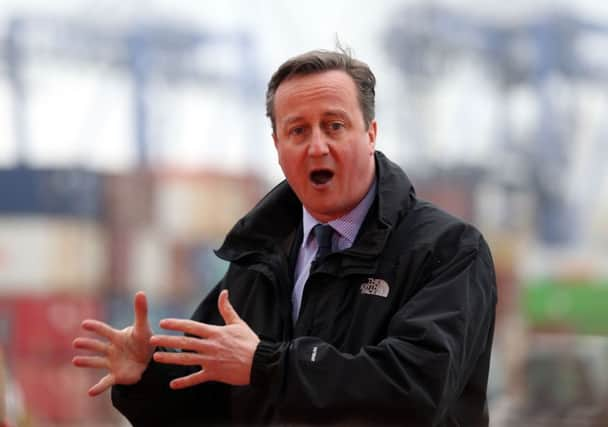Greg Wright: Firms face crippling uncertainty over EU referendum


Today – although, sadly, all three of the above still exist – their biggest fear is uncertainty.
That’s uncertainty over the flow of trade, uncertainty over regulations, uncertainty over the supply of skilled labour and uncertainty over the shape of the political landscape.
Advertisement
Hide AdAdvertisement
Hide AdSo you’ll be unsurprised to hear that many firms regard the EU referendum as an unwelcome and potentially costly distraction. And that’s putting it nicely.
As sections of the global economy suffer an almighty wobble, it would be the height of folly for Britain to adopt a position of unsplendid isolation, outside a powerful trading bloc.
It’s a well known fact that investment falters in the run up to an election. Fewer jobs are created; the economy is denied the chance to move up a gear. This is what happened last year in the months leading up to the General Election.
The same thing is probably happening today, as the referendum campaign rumbles into action.
Advertisement
Hide AdAdvertisement
Hide AdLast month, the recruitment firm Hays said that some British firms were likely to delay their hiring decisions until after the referendum.
If this prediction is correct, then the referendum is already harming our economy. More job-seekers will face months of frustration.
After securing an unexpected majority at the last General Election, David Cameron has repeatedly, and spectacularly, flicked the ball into the net. His own net. First, there was his ineffectual response to the terrible floods that hit swathes of Yorkshire and the North.
Now we’re facing a vote over our continued membership of the EU, which is the cornerstone of Mr Cameron’s strategy to destroy the threat Ukip poses to the Tory party’s long term prospects.
Advertisement
Hide AdAdvertisement
Hide AdApart from splitting his own Cabinet, Mr Cameron has thrown more uncertainty into the lives of our business leaders, at a time when they could really do without it.
Last week Andy Tuscher, the regional director of the EEF, which speaks up for manufacturing firms, said there was broad recognition that trade deals are negotiated between blocs rather than individual nations.
If Britain decides to stand alone, it will be at a real disadvantage.
The EEF’s recent survey concluded that only five per cent of its members supported Brexit, and 82 per cent believed that the UK can play a big role in helping the EU to become more efficient, and work harder for its member states.
Advertisement
Hide AdAdvertisement
Hide AdIf we vote for Brexit, of course, we will have no opportunity to shape EU policy.
Our manufacturers don’t take a romantic view – they know the EU is far from perfect but they believe the best way forward is to stay inside and fight to improve it.
This, of-course, could be interpreted as a vindication of Mr Cameron’s position. He wants Britain to stay in the EU, now he has agreed a package of changes to the UK’s membership.
But outstanding issues linked to our ties with the EU should have been debated and resolved last year – that’s what General Elections are there for.
Advertisement
Hide AdAdvertisement
Hide AdIf Mr Cameron’s concerns about the EU were really so deep-rooted, why did it take him so long to start banging his fist at the negotiating table?
The planned changes to the UK’s EU membership should have been negotiated before the 2015 election, and presented as a package of measures before the electorate.
Instead of debating the nature of our ties with Europe in isolation, we would have been able to take a broader view of the political parties’ priorities.
By now, a decision over our links with the EU should have been made, and companies wouldn’t have this terrible cloud of doubt hanging over them.
For some firms, this uncertainty can be as deadly as any plague.